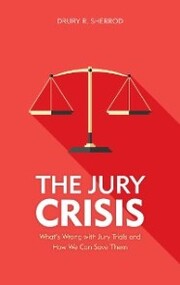<span>Juries have a bad reputation. Often jurors are seen as incompetent, biased and unpredictable, and jury trials are seen as a waste of time and money. In fact, so few criminal and civil cases reach a jury today that trial by jury is on the verge of extinction. Juries are being replaced by mediators, arbitrators and private judges. The wise trial of Twelve Angry Men has become a fiction. As a result, a foundation of American democracy is about to vanish.<br><br></span><span>The Jury Crisis: Whats Wrong with Jury Trials and How We Can Save Them</span><span>addresses the near collapse of the jury trial in America its causes, consequences, and cures. Drury Sherrod brings his unique perspective as a social psychologist who became a jury consultant to the reader, applying psychological research to real world trials and explaining why juries have become dysfunctional.<br><br>While this collapse of the jury can be traced to multiple causes, including poor public education, the absence of peers and community standards in a class-stratified, racially divided society, and peoples reluctance to serve on a jury, the focus of this book is on the conduct of trials themselves, from jury selection to evidence presentation to jury deliberations. Judges and lawyers believe wrongly that jurors can put aside their biases, sit quietly through hours, days or weeks of conflicting testimony, and not make up their minds until they have heard all the evidence. Unfortunately, the human brain doesnt work that way. A great deal of psychological research on jurors and other decision-makers shows that our brains intuitively leap to story-telling before we rationally analyze facts, or evidence. Weaving details into a narrative is how we make sense of the world, and its very hard to suppress this tendency. Consequently, a majority of jurors actually make up their minds before they have heard much of the evidence. Judges, arbitrators and mediators have similar biases.<br><br></span><span>The Jury Crisis</span><span> deals with an important social problem, namely the near collapse of a thousand year old institution, and proposes how to fix the jury system and restore trial by jury to a more prominent place in American society.</span>
Drury Sherrod,PhD, is the co-founder of Mattson& Sherrod, Inc., a jury research firm specializing in trial strategy and jury selection for high-damage civil defense trials, many involving Fortune 500 companies. Sherrod is a member of the American Society of Trial Consultants, the American Psychological Association, and the Society for Experimental Social Psychology. Along with authoringSocial Psychology (1982), he has authored more than thirty articles on psychology, jury behavior, attribution theory and the effects of environmental stress on human behavior. He has, also, written hundreds of narrative-style opening statements for jury trials, which were adopted by attorneys and presented to actual trial jurors. Sherrod hasgiven many talks on jury trials and juries in America to a variety of audiences, including college classes, law firms, bar associations, legal conferences, professional associations and groups interested in law and the social sciences, and has also presented research findings to hundreds of attorneys in law firms across the United States. You an visit his website athttps://www.thejurycrisis.com/.
AcknowledgmentsIntroduction: Whats Wrong with Juries?1 Triers of Fact2 Supplying Facts in Early Juries3 How Jurors Use Facts to Tell Stories4 Why Jurors Prefer Stories over Facts5 Jury Selection: Identifying Who Will Tell Which Stories6 Jury Selection in a Product-Liability Lawsuit7 Jury Deliberations: The Stories Widen8 Jury Deliberations in Real Trials9 Storytellers in Robes10 The Biases behind Judges Stories11 The Vanishing Jury12 Trying the Jury Trial13 Junk the Jury or Fix the Flaws?NotesBibliographyIndexAbout the Author
„E-Book“ steht für digitales Buch. Um diese Art von Büchern lesen zu können wird entweder eine spezielle Software für Computer, Tablets und Smartphones oder ein E-Book Reader benötigt. Da viele verschiedene Formate (Dateien) für E-Books existieren, gilt es dabei, einiges zu beachten.
Von uns werden digitale Bücher in drei Formaten ausgeliefert. Die Formate sind EPUB mit DRM (Digital Rights Management), EPUB ohne DRM und PDF. Bei den Formaten PDF und EPUB ohne DRM müssen Sie lediglich prüfen, ob Ihr E-Book Reader kompatibel ist. Wenn ein Format mit DRM genutzt wird, besteht zusätzlich die Notwendigkeit, dass Sie einen kostenlosen Adobe® Digital Editions Account besitzen. Wenn Sie ein E-Book, das Adobe® Digital Editions benötigt herunterladen, erhalten Sie eine ASCM-Datei, die zu Digital Editions hinzugefügt und mit Ihrem Account verknüpft werden muss. Einige E-Book Reader (zum Beispiel PocketBook Touch) unterstützen auch das direkte Eingeben der Login-Daten des Adobe Accounts – somit können diese ASCM-Dateien direkt auf das betreffende Gerät kopiert werden.
Da E-Books nur für eine begrenzte Zeit – in der Regel 6 Monate – herunterladbar sind, sollten Sie stets eine Sicherheitskopie auf einem Dauerspeicher (Festplatte, USB-Stick oder CD) vorsehen. Auch ist die Menge der Downloads auf maximal 5 begrenzt.






